The advancement of technology has resulted in significant changes in the HR hiring departments. AI recruiting tools can help businesses and HR professionals enjoy automated hiring. As a result, finding a candidate to fill an open position in an organization is easier. It should be noted that there are many AI-based recruiting tools on the market today, making it difficult to select the best AI recruiting tools for 2024.
In today’s dynamic job market, incorporating artificial intelligence (AI) into the recruitment process has become an essential strategy for organizations that seek to successfully and efficiently identify the best-fit candidates. Traditional hiring methods are being redefined by AI recruiting tools that streamline various aspects of the process, from candidate sourcing to onboarding.
In this comprehensive guide, we will delve into the world of AI recruiting tools, exploring their significance, selection criteria, top tools of 2024, case studies, challenges, implementation steps, and future trends.
Affiliate Disclosure: Some of the links in this article could be affiliate links, which provide $$$ to me at no cost to you if you decide to purchase the tool.
What are AI Recruiting Tools?

AI recruiting tools are a collection of software and technologies that use AI and ML to improve various aspects of the hiring process. These tools are intended to improve candidate assessment, reduce bias, and ultimately assist organizations in making more informed hiring decisions.
How Do AI Recruiting Tools Enhance the Hiring Process?
AI recruiting tools offer a plethora of benefits that significantly improve the efficiency and effectiveness of the hiring process:
- Efficient Candidate Sourcing: AI tools can swiftly scan through numerous resumes and online profiles to identify potential candidates that match specific job requirements.
- Enhanced Candidate Screening: These tools use advanced algorithms to assess candidates based on their skills, experience, and qualifications, providing a shortlist of the most suitable candidates.
- Bias Reduction: AI recruiting tools can help mitigate unconscious biases by focusing on objective data rather than personal characteristics.
- Improved Candidate Engagement: AI-powered chatbots can engage with candidates, answer their queries, and keep them informed about the hiring process.
- Predictive Analytics: AI tools can analyze historical data to predict the success of candidates, enabling better-informed decisions.
- Streamlined Workflow: These tools automate manual tasks such as scheduling interviews, sending follow-up emails, and collecting feedback.
- Data-Driven Insights: AI tools provide valuable insights into recruitment metrics, helping organizations refine their strategies over time.
💡 Related guide: 13 Best AI Tools for Affiliate Marketing in 2023
What Features Should You Look for in AI Recruiting Tools?
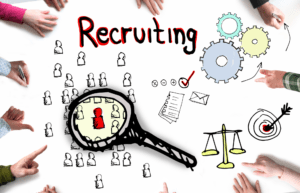
When selecting AI recruiting tools, consider the following features to ensure optimal performance and alignment with your organization’s needs:
- Natural Language Processing (NLP): Look for tools with advanced NLP capabilities to accurately parse and understand candidate resumes and profiles.
- Candidate Matching: The tool should offer sophisticated algorithms that match candidates’ skills and qualifications with job requirements.
- Bias Detection: Choose tools that incorporate bias detection mechanisms to ensure fair and objective candidate evaluation.
- Integration: Prefer tools that seamlessly integrate with your existing HR software and applicant tracking systems.
- Analytics and Reporting: The tool should provide comprehensive analytics and reporting features to track key recruitment metrics.
- Customization: Look for tools that allow you to customize the recruitment process and criteria based on your organization’s unique needs.
- User-Friendly Interface: A user-friendly interface is essential for easy adoption and efficient usage across your HR team.
How Can AI Recruiting Tools Help in Sourcing and Vetting Candidates?

AI tools revolutionize candidate sourcing and vetting through the following methods:
- Automated Sourcing: AI tools can scour the internet for potential candidates, aggregating data from various sources.
- Semantic Matching: These tools analyze candidate profiles using semantic keywords to identify relevant skills and experiences.
- Skill Gap Analysis: AI tools can highlight skill gaps in candidates’ profiles, helping organizations make targeted training decisions.
- Behavioral Assessment: Some tools use AI-driven assessments to gauge candidates’ behavior, personality traits, and cultural fit.
- Video Interviews: AI-powered video interview platforms analyze candidates’ facial expressions, tone, and content to assess their suitability.
The Growing Importance of AI Recruiting Tool

The rise of AI in the recruitment landscape represents a watershed moment in how businesses approach talent acquisition. Artificial intelligence technologies have the potential to analyze massive amounts of data, automate repetitive tasks, and uncover insights that were previously hidden in manual processes. This game-changing capability enables recruiters to make data-driven decisions, resulting in better hiring outcomes.
AI recruiting tools are becoming increasingly important as the job market evolves. They collaborate with website builders, marketing tools, and landing page builders as integral team members. They do more than just find candidates; they also facilitate genuine connections.
There are numerous ways to assess products and vendors: the breadth or depth of features offered, the innovation used, the price, global availability, the expertise of the application, the degrees of assistance and instruction provided, the vendor’s reputation for integrity or eco-consciousness, and no doubt others. Products that rose to the top are considered here; some are complete ATSes, while others are talent-augmenting systems.
What Are The Best AI Recruiting Tools?
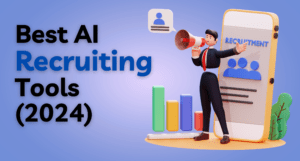
Here are my top picks for the best AI recruiting tools to use this year:
- Paradox
- Fetcher
- Manatal
- hireEZ
- HireVue
- Findem
- eightfold
- Humanly
- Turing
- TurboHire
- Skillate
- Talenture
- Textio
1. Paradox
Best For High-Volume Hiring
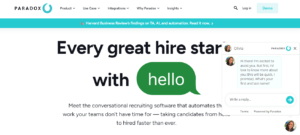
Olivia, a conversational AI engine used by Paradox, acts as a middleman between recruiters and candidates, passing necessary details, taking requests, and answering questions. While we don’t believe it makes all discussions feel exactly like humans talking to humans, we believe it does a good job of making the interactions feel human-like enough.
Our initial impression of Paradox’s screening capabilities was favorable. The platform’s potential to promote job openings via physical banners, flyers, and social media, combined with Olivia’s 24-hour accessibility for greeting and screening applicants, can be a real game – changer for quickly filling multiple positions.
As interacting with AI has become more comfortable, particularly when the conversation is relevant in today’s world, Paradox’s trained AI, Olivia, has done an excellent job engaging with candidates on behalf of recruiters. Olivia is able to text candidates, share relevant job descriptions, collect candidate information, schedule interviews, and work outside of recruiters’ normal business hours.
However, as with any other AI recruitment tool, it might not be able to manage queries which exceed its pre-programmed knowledge. Experienced recruitment agencies are better suited to tasks such as evaluating credentials and validating email addresses.
💡 Key Features
- Conversational AI for HR tasks
- Comprehensive recruiting functionalities with Olivia
- Integration with ATS and CRM systems
- Onboarding support for new hires
Pros
- ✅ Enhanced candidate experience with engaging chat interface
- ✅ Reduced recruiter workload through automation
- ✅ Improved hiring efficiency and quality with data-driven insights
Cons
- ❌ High cost, potentially inaccessible for small-medium businesses
- ❌ Limited customization for diverse needs and preferences
- ❌ Possible technical glitches affecting performance
✍ Final Verdict
Paradox offers a potent and innovative AI recruiting solution, revolutionizing the hiring process with improved candidate experience, automation-driven efficiency, and insights. Despite potential drawbacks, it can greatly benefit both recruiters and candidates, warranting comparison with other tools for optimal fit.
💡 Related guide: 11+ Best AI Video Editing Software of 2023 ( Ranked & Reviewed)
2. Fetcher
Best Outreach & Sourcing Tool
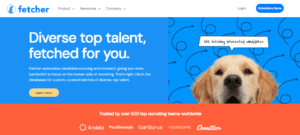
Fetcher, as an AI recruiting software tool, aids in the efficient management of the early phases of the hiring process. Fetcher’s powerful sourcing tool employs artificial intelligence (AI) technology to deliver carefully selected profiles tailored to specific skill sets and requirements.
Additionally, the automated outreach capabilities of the software can enable personalized email sequences, ensuring efficient candidate engagement. Fetcher also provides a comprehensive reporting dashboard for tracking hiring metrics and evaluating the success of recruitment efforts.
💡 Key Features
- Curated batches of candidates based on search criteria
- Automated outreach through personalized email campaigns
- Analytics and diversity insights for top-of-funnel performance
- Integration with ATS for smooth workflow
Pros
- ✅ Time and cost savings through automated sourcing
- ✅ Improved response rates with personalized email campaigns
- ✅ Enhanced diversity strategy with insights and targeting
- ✅ Analytical support for sourcing and outreach strategy
Cons
- ❌ Not free; pricing varies based on plans
- ❌ Still requires human review, customization, and follow-up
✍ Final Verdict
Fetcher is a robust AI recruiting tool that streamlines candidate sourcing and engagement. Its features include curated candidate batches, automated email campaigns, analytics, and ATS integration. Fetcher offers benefits in time, efficiency, diversity, and strategy. While not free, it offers valuable automation and insights to enhance recruitment efforts.
💡 Related guide: 9+ Best SEO Software Tools of 2023 (Honest Reviews & Free Options)
3. Manatal
Best Overall Recruiting Tool For SMB’s
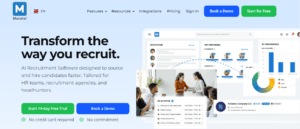
Manatal goes far beyond the standard features of a low-cost ATS by incorporating AI-powered actions like candidate sorting and recommendations. This distinguishes it as a truly outstanding option, especially for SMBs looking to optimize their hiring process.
Let’s begin with the advantages. Manatal’s affordability is one of its main advantages, with pricing plans starting at just $15 USD per month. It also provides a generous 14-day free trial, allowing you to put it through its paces before committing.
The platform also checked the user-friendly UI box by including pipelines that can be dragged and dropped.
Although Manatal has a limited number of custom build integrations, the solution only provides API and Zapier integrations to Custom plan users.
While the AI recommendation feature works well with English resumes, it does not work with resumes in other languages.
Finally, users can search for applicants using Boolean Search or Advanced Search, but not both, limiting search capabilities.
💡 Key Features
- Candidate sourcing from various channels, including parsing and enriching resumes
- Customizable applicant tracking pipeline
- Recruitment CRM for agencies and headhunters
- AI-driven job matching and recommendations
- Collaboration tools and integration with calendar/mailbox
- Reports and analytics suite
- Branded career page creation
- Data privacy compliance and security measures
Pros
- ✅ User-friendly interface
- ✅ Transparent and affordable pricing
- ✅ Customizable and flexible
- ✅ Powerful AI capabilities
Cons
- ❌ May lack certain industry-specific features or integrations
- ❌ Occasional bugs or glitches due to updates
✍ Final Verdict
Manatal is a comprehensive and user-friendly AI recruiting tool suitable for HR teams, agencies, and headhunters. It offers efficient candidate sourcing, AI-driven insights, and a range of customizable features. While it may lack certain specific functionalities and encounter occasional bugs, it presents a valuable solution to streamline and enhance the recruitment process across industries.
💡 Related guide: 7+ Best AI Copywriting Tools for Beginners in 2023 (Ranked & Reviewed)
4. hireEZ
Best For Mid-sized & Large Businesses
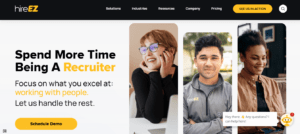
hireEZ, formerly Hiretual, employs artificial intelligence in acquiring, interaction, integrations, predictive analysis, and partnership. It enables companies to recruit on a large scale by automating time-consuming manual tasks.
Users have given hireEZ high marks for its no-nonsense automation features. The platform’s primary focus is outbound recruiting and was designed for mid-sized and large businesses. It has used AI to develop some excellent sourcing, engagement modules, and analytics features.
I like the simplistic UI; the features are logically organized, and the workflows are simple. hireEZ even offers an assigned account manager for personal support, but we haven’t run into much that requires their assistance.
hireEZ’s AI-powered candidate recommendation tool is my favorite feature. It functions similarly to a personal sourcing assistant who sends out an email every day with the best candidates they’ve found.
Users who have used the automated email sequences have mostly given positive feedback. When tracking a candidate’s performance and progress, they frequently emphasize time savings and increased efficiency.
The GPT3-backed AI applied to automated emails is an exciting new feature to keep an eye on.
There are some downsides to hireEZ that you should be aware of. Some users reported that the candidate data was occasionally inaccurate. According to multiple reports, the platform does not work well with LinkedIn.
💡 Key Features
- AI Sourcing with NLP-driven search and advanced filters
- Detailed candidate profiles with skills, experience, availability, and more
- Personalized and automated email campaigns with tracking
- Market insights for talent landscape understanding
- Integrations with ATSs, CRMs, and job boards
Pros
- ✅ Extensive candidate database, including underrepresented talent
- ✅ AI-powered search and ranking for efficiency
- ✅ Comprehensive candidate insights and market value assessment
- ✅ Personalized and automated email engagement
- ✅ Market intelligence for strategic hiring planning
Cons
- ❌ Higher pricing compared to some alternatives
- ❌ Limited free trial scope and feature access
- ❌ Reliance on open web data, limiting data availability
✍ Final Verdict
HireEZ is a robust AI recruiting tool tailored for outbound recruiting. It offers efficient AI-driven candidate sourcing, detailed insights, personalized email campaigns, and market intelligence. While it presents benefits such as a diverse candidate pool and AI-powered features, its higher pricing and dependency on open web data may be limiting factors. Evaluating its value against specific needs and considering alternatives is recommended.
💡 Related guide: 13 Best AI Email Writer & Generator Tools for 2023
5. HireVue
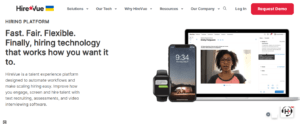
HireVue is an AI recruiting software that is suitable for large-scale hiring. I appreciate how they’ve combined virtual assistance/automation with responsive human support.
HireVue is a recruiting platform powered by AI that automates workflows. They offer solutions for video interviewing, assessments, scheduling, and text message recruiting. Its technology aims to reduce human bias while increasing diversity.
My favorite feature of HireVue is its Virtual Hiring Assistant. It screens applicants efficiently, directs them to relevant job vacancies, schedules interviews, manages events, and coordinates with candidates on behest of hiring managers.
While we believe the mix of AI and human interaction is well balanced, it is possible that some candidates will be demotivated from having to interact with a machine. To account for this, the platform helps to keep recruiters informed of the progress of the process.
HireVue is a powerful tool which will most probably be out of reach for smaller teams, but the upfront pricing is appealing.
They have two plans, the less expensive of which starts at $35k/month, and the platform is a good investment for teams of 2,500 or more, according to users we interviewed.
This tool works well with many ATS’s, yet nothing can be said of HRIS tools. This can be a disadvantage for businesses looking to sync data across HR tools.
💡 Key Features
- Text-powered recruiting assistant: Utilizes natural language processing to engage candidates, provide information, and guide them through the hiring process.
- Video interviewing software: Enables candidates to record responses to questions, with AI analyzing verbal and non-verbal cues for insights.
- Assessments: Measures cognitive abilities, skills, and traits through gamified challenges, coding tests, and situational scenarios.
- Integration: Seamlessly integrates with various ATS platforms, supports multiple languages, devices, and browsers.
Pros
- ✅ Saves time and money by reducing time-to-hire and cost-per-hire.
- ✅ Improves quality of hire by reducing bias, human error, and offering data-driven insights.
- ✅ Enhances candidate experience with engaging, fair, and respectful hiring processes.
Cons
- ❌ Challenges in accuracy, reliability, and validity of AI algorithms and assessments.
- ❌ Potential ethical and legal concerns regarding data collection and usage.
- ❌ Requires training and support for effective use, customization, and adaptation.
✍ Final Verdict
HireVue’s AI recruiting tool is a cutting-edge solution that automates and optimizes the hiring process, benefiting both organizations and candidates. While it offers substantial benefits in terms of efficiency, quality, and candidate experience, there are potential challenges related to accuracy, ethical considerations, and user training.
Overall, HireVue’s tool can significantly transform hiring processes and outcomes, making it a recommended option for those seeking AI-powered recruitment solutions.
💡 Related guide: 13 Best Issue-Tracking Software of 2023
6. Findem
Best For Corporate Role Hiring
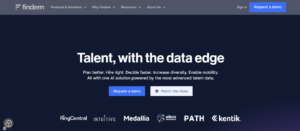
Findem is the only tool in this category that makes it possible to identify candidates using technical and abstract characteristics, which traditional keyword matching does not.
Findem’s unusual candidate sourcing allows you to tap into an international talent pool of over 750 million candidates.
The system crawls several data sources, including LinkedIn, GitHub, Behance, Stack Overflow, Kaggle, and social media platforms, using AI to consolidate all unique candidate information into profiles that list all of their achievements, qualifications, core values, and so on. This allows you to quickly source a large number of candidates using the most precise and stringent criteria.
Findem is a cutting-edge AI recruiting tool that is transforming hiring process and workforce analytics. Findem, which uses cutting-edge AI technology, provides comprehensive insights into talent markets, assisting organizations in deciding on qualified candidates.
Findem’s vast data network and advanced algorithms quickly detect and evaluate potential candidates, allowing recruiters to efficiently identify the ideal match for their organization.
With its AI-powered capabilities, Findem optimizes the hiring process and pushes strategic workforce planning.
💡 Key Features
- People Search: Search candidates based on criteria and natural language queries from various sources.
- Talent CRM: Manage and engage candidates, with AI-powered outreach and response measurement.
- Diversity Recruiting: Data-driven insights and filters to promote diversity and inclusivity.
- Candidate Rediscovery: Re-engage past applicants and identify potential candidates.
- Recruitment Analytics: Gain insights into hiring performance, strategy, and market trends.
Pros
- ✅ Time & Cost Savings: Automation streamlines sourcing and outreach, reducing manual efforts.
- ✅ Quality & Diversity: Improves pipeline quality and diversity by targeting relevant candidates.
- ✅ Competitive Insights: Provides data-driven talent market and hiring trend insights.
- ✅ Strategy Optimization: Offers feedback and recommendations to refine hiring strategy.
Cons
- ❌ Niche Roles: May struggle to find candidates for specific, specialized roles.
- ❌ Human Interaction: Cannot replace human relationship-building with candidates.
- ❌ Compatibility: May not integrate well with all ATS, CRM systems, or third-party tools.
✍ Final Verdict
Findem is a robust AI recruiting tool for efficient end-to-end hiring, offering automation, insights, and diversity focus. Suitable for various industries and sizes, it may fall short in specialized roles and complete human interaction. A trial or demo is recommended before committing.
💡 Related guide: 13 Best AI Tools for Students in 2023
7. eightfold
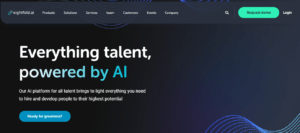
Eightfold’s AI-powered platform automatically matches relevant candidates to your available jobs. It is also one of the few hiring platforms that includes employee guidance and skill development attributes.
Eightfold is an excellent choice for recruiting managers looking to source and hire a large number of candidates. This is due to the fact that it assesses and reviews millions of resumes in seconds, weeding out the most qualified candidates for the open position.
Additionally, this AI-powered tool directs job seekers to the most appropriate jobs based on their profiles. These features make the talent acquisition and management processes easier.
Eightfold’s deep learning capability also identifies job applicants’ skills through a detailed mapping of skill sets. It eliminates the uncertainty associated with assessing a candidate’s skills by identifying Validated Skills, Likely Skills, Skills to be Validated, and Missing Skills.
The platform also contains a handy scheduler that connects to corporate calendars to automate interview scheduling. Furthermore, it allows you to manage lots of interviews and reschedule or withdraw them as needed.
💡 Key Features
- Talent Acquisition: AI-driven sourcing, reducing hiring time and improving candidate experience.
- Talent Management: Personalized career paths, learning plans, and performance feedback.
- Talent Flex: Workforce optimization with internal talent marketplaces and external talent pool management.
- Workforce Exchange: Collaboration to share talent with partner organizations.
- DEI Focus: Removing bias from hiring, measuring and enhancing diversity, equity, and inclusion.
- Governance: Ensuring compliance, security, and ethical AI decision-making.
Pros
- ✅ Advanced AI Handling: Capable of managing complex and dynamic talent scenarios.
- ✅ Holistic Talent View: Offers comprehensive insights across the entire workforce lifecycle.
- ✅ Actionable Insights: Provides tailored recommendations for improved outcomes.
- ✅ Improved Talent Metrics: Enhances quality, speed, cost, retention, engagement, and DEI.
- ✅ Seamless Integration: Integrates well with existing systems and platforms.
Cons
- ❌ Data Input Requirement: Needs substantial data input and maintenance for accurate AI models.
- ❌ Compatibility Limitations: May not work with certain legacy or niche systems.
- ❌ Affordability Concerns: Might be costly and unsuitable for smaller businesses.
✍ Final Verdict
Eightfold emerges as a leading AI recruiting tool, offering a comprehensive solution for end-to-end talent management. Its strength lies in improving talent processes, diversity, equity, and inclusion initiatives. However, data input demands and compatibility issues could be hurdles. If seeking efficient and effective talent management, exploring Eightfold could be beneficial.
💡 Related guide: Best AI Tools for Business in 2023
8. Humanly
Best For Medium-Sized Companies
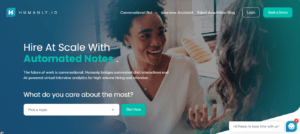
The AI recruiting chatbot from Humanly.io dribbles, facilitates, and optimizes recruiters’ recurring interactions within the candidate screening, interview scheduling, reference checking, and re-engagement processes. It’s ideal for high-volume, hourly, and entry-level positions.
Humanly has created an AI-powered chatbot specifically designed for mid-market businesses that need a tool that is simple and quick to enact.
Your recruiting team will be able to screen and schedule candidates in a DEI-friendly manner thanks to their product. It can also combine with your ATS and sync data, removing the need for physical labor in another system.
They are doing a lot of fascinating things, such as using data from your performance tracking system to constantly improve their screening of candidates so you’re able to make the best hires.
Check them out if you’re a mid-market company looking to add a chatbot, text recruiting, or AI capabilities to your talent acquisition tech stack.
💡 Key Features
- Conversational AI: Personalized chatbot conversations for candidate engagement.
- Role-specific templates: Library of templates or customizable questions for different roles.
- Candidate screening: Assess skills, experience, personality, and motivations.
- Interview scheduling: Automated scheduling and reminders for interviews.
- Interview assistant: AI-generated notes, follow-up emails, and interview insights.
- Diversity and inclusion: Reduces bias, promotes fair evaluation, and diversity.
- Analytics and reporting: Metrics tracking for hiring performance and improvements.
Pros
- ✅ Time & Resource Savings: Automation in screening and scheduling.
- ✅ Enhanced Candidate Experience: Continuous feedback and guidance.
- ✅ Informed Hiring Decisions: AI-powered interview analytics.
- ✅ Diversity & Inclusion: Bias reduction and fair evaluation.
- ✅ Seamless Integration: Works with existing sourcing sites and ATS.
Cons
- ❌ Limited Handling: May not cover all candidate questions or scenarios.
- ❌ Training/Customization Needed: Requires adjustment for specific needs.
- ❌ Communication Channel Limits: Compatibility constraints with communication channels.
✍ Final Verdict
Humanly is an AI recruiting tool that automates screening, scheduling, and interview analytics. Suited for medium-sized companies seeking streamlined hiring with conversational AI. Also beneficial for improving candidate experience, diversity, inclusion, and overall hiring performance. Consider a demo or free trial to experience its benefits.
💡 Related guide: 11 Best AI Marketing Tools to Automate your Business (2023)
9. Turing
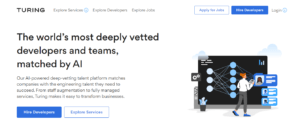
Turing, which provides their AI-backed Intelligent Talent Cloud to help source, vet, match, and manage the best remote software developers worldwide, is the best option for a company recruiting AI talent.
The platform, which is used by some of the world’s leading companies such as Pepsi, Dell, and Coinbase, combines sourcing strategy, intelligent scrutinizing, extensive matching, HR/payments adherence, and automated on-the-job quality control.
Turing does an excellent job of making remote hiring simple for both businesses and developers. Businesses may recruit pre-vetted, highly qualified remote software talent with over 100 skills. The entire procedure takes only 3-5 days.
The Intelligent Talent Cloud uses AI to vet, match, and handle over 1.5 million programmers worldwide, saving businesses a significant amount of time and resources as they build an engineering team in days.
💡 Key Features
- Deep-vetting: Comprehensive assessment of developers’ skills, experience, communication, personality, and preferences.
- AI-matching: AI recommendation engine matches developers to projects based on requirements, preferences, and budget.
- Remote management: Secure platform for collaboration, task assignment, progress monitoring, code review, and feedback.
- Scalability: Flexible hiring options for various project needs, durations, and roles.
Pros
- ✅ Speed: Quick hiring within 3-5 business days.
- ✅ Quality: Access to deeply vetted developers with proven skills.
- ✅ Cost: Competitive pricing, savings on overheads.
- ✅ Diversity: Global talent pool for diverse perspectives.
Cons
- ❌ Trust: Some may prefer more human involvement in the hiring process.
- ❌ Integration: Limited integration with existing tools.
- ❌ Availability: Challenges in finding specific skills or preferred time zones.
✍ Final Verdict
Turing, an innovative AI recruiting tool, offers speedy, cost-effective access to deeply vetted remote developers. While it revolutionizes hiring, preferences and integration needs should be considered. Turing provides a powerful solution for tech talent recruitment, but evaluating personal requirements is advised.
💡 Related guide: Best Credit Repair Software Options: Turbocharge your finances (2023)
10. TurboHire
Best For Automated Job Recommendations
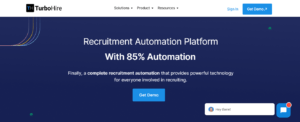
TurboHire is a data-driven intelligent recruitment platform. It is well-structured and offers numerous opportunities for beneficial cooperation.
TurboHire can provide deep insights into potential candidates by combining human and machine intellect.
When it comes to customer data, the platform is also extremely secure, and it encrypts communications between customers and the cloud.
💡 Key Features
- Talent Intelligence: AI-based candidate ranking, talent market insights, and competitor analysis.
- Recruitment Automation: Automates sourcing, screening, scheduling, reminders, and offer letter generation.
- Candidate Experience: Personalized journey, chatbot support, feedback collection, and updates.
- Recruitment Analytics: Data-driven insights, performance metrics, bottleneck identification.
Pros
- ✅ Ease of Use: Cloud-based, integrates with various tools, user-friendly setup.
- ✅ Security: ISO 27001, GDPR, SOC 2, and EEO compliant for data security.
- ✅ Flexible Pricing: Based on active jobs and users, offers free trial and demo.
Cons
- ❌ Focus Limitation: Suited for high-volume hiring, may lack personalization for niche or executive roles.
- ❌ Language Limitation: Supports only English, may not cater to other languages or regional preferences.
✍ Final Verdict
TurboHire is an innovative AI recruiting tool that streamlines recruitment processes, enhances candidate experience, and provides valuable insights. Recommended for scaling teams, it’s best suited for enterprises and mid-market companies. Despite limitations in role scope and language support, TurboHire stands out as a powerful tool for efficient and effective hiring.
💡 Related guide: Best Transcription Software & Services to convert audio/video to text (2023)
11. Skillate
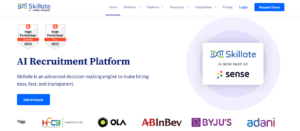
Skillate is one of the best AI hiring tools on the market. It is a sophisticated decision-making engine that can greatly enhance the recruitment process by providing AI-powered intelligent hiring services, people analytics, and enhanced applicant experiences.
Businesses can focus on making unbiased decisions thanks to the tool’s ability to mark personal information about potential hires.
Skillate, an innovative decision-making tool, simplifies and accelerates the recruiting process. It offers improved applicant experiences, AI-powered intelligent recruiting services, and advanced analytics.
Additionally, Skillate allows businesses to disguise candidate data in order to make objective hiring decisions.
Skillate is an AI-driven recruitment tool designed to simplify and enhance the hiring process using artificial intelligence. This software provides a range of features that cater to various stages of recruitment, including resume matching, chatbot screening, interview scheduling, and analytics.
💡 Key Features
- AI-Powered Matching Engine: Utilizes natural language processing and deep learning to match resumes with job descriptions based on various criteria.
- Chatbot Screening: Engages candidates through conversational chatbot interactions, collecting relevant information beyond resumes.
- Resume Parser: Utilizes deep learning to extract structured data from diverse resume formats for easy analysis.
- Auto Interview Scheduler: Automates interview scheduling by finding common availability between candidates and hiring managers.
- Job Description Assistant: Assists in crafting compelling job descriptions by offering real-time feedback and suggestions.
- Dashboard and Analytics: Provides data-driven insights into the recruitment process, aiding monitoring and analysis.
Pros
- ✅ Skillate offers a comprehensive solution covering the entire hiring cycle.
- ✅ It seamlessly integrates with major ATS and email platforms.
- ✅ The software is GDPR compliant with robust data security measures.
- ✅ Skillate encourages unbiased hiring and offers diversity analytics.
- ✅ Demonstrated success with significant reductions in screening time and post-offer dropouts.
Cons
- ❌ The tool has limited brand recognition compared to competitors.
- ❌ Transparent pricing is lacking on the website.
- ❌ Skillate’s chatbot has limitations in handling complex queries.
✍ Final Verdict
Skillate offers a well-rounded AI recruiting solution that streamlines hiring while prioritizing candidate experience and diversity. With a strong customer base and positive reviews, Skillate suits organizations seeking an efficient approach to talent acquisition.
💡 Related guide: Best Text-to-speech Apps for Android in 2023
12. Talenture

Talenture is an AI hiring platform that employs AI and machine learning engine insights. It has a virtual hiring expert who assists businesses in continuously monitoring job processing, and it ranks candidates based on various criteria such as job prospects and availability.
Talenture has a mobile app and offers candidate sourcing services from social media, job boards, and career sites, among other places.
Marvin, a virtual recruiting consultant, monitors and guides the recruiting process for businesses.
Intelligent Algorithms are used to rate applicants based on criteria such as recentness, availability, employability, or a combination of these three.
Talenture is an AI-powered hiring platform that automates the hiring process. It employs an AI-powered virtual expert named Marvin to rank candidates based on factors such as relevance and employment prospects.
💡 Key Features
- Candidate Sourcing: Talenture retrieves candidates from various sources and parses resumes for relevant information.
- Job Description Assistant: It utilizes AI for writing compelling job descriptions and optimizing them for SEO.
- Auto-Interview Scheduler: The platform automates interview scheduling and sends reminders.
- Data-Backed Insights: Talenture offers analytics to optimize recruitment strategies.
Pros
- ✅ Efficiency: Talenture saves time and costs by automating recruitment.
- ✅ Candidate Selection: It employs AI and ML algorithms to identify top candidates.
- ✅ Candidate Experience: The platform provides personalized communication, enhancing candidate engagement.
- ✅ Hiring Quality: It reduces bias and human error, thereby improving overall hiring quality.
Cons
- ❌ Compatibility: Talenture may not integrate seamlessly with all ATS or CRM systems.
- ❌ Niche Hiring: The platform might not cater to complex or specialized hiring needs.
- ❌ Learning Curve: Users may need training or support for effective utilization.
✍ Final Verdict
Talenture is a robust AI recruiting tool that simplifies sourcing, screening, and managing candidates while offering valuable insights. It’s recommended for businesses seeking streamlined hiring processes, though suitability varies. Potential users should explore the platform to determine alignment with their unique requirements.
💡 Related guide: Hyperlocal Social Media Marketing: The Secret Sauce to crushing your competitors!
13. Textio
Best For Hiring Marketing Optimization
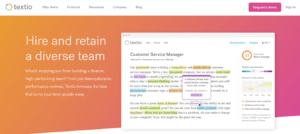
Textio is a popular AI-powered content optimization tool for hiring teams, marketing managers, and copywriters.
This assists users in avoiding age, ability, and discrimination in corporate branding content.
Textio is laser-focused on the employer brand content optimization niche, allowing it to provide fine-tuned, specialized, and in-depth features.
I liked how the UI looked and felt. It reminded me of Grammarly and Hemingway Editor in its simplicity and effectiveness.
It also included a sidebar with color-coded analytics to assist our writer in visualizing the gameplay.
Instead of starting from scratch, Textio’s document library allows users to reuse shared content created by other team members. We believe this could be a big help for large enterprises that produce thousands of job listings per year, because chances are that somebody has previously written something very close to what’s required.
Textio, like a library, allows users to organize their documents into groups so they are aware of where to look when seeking out a particular type of copy.
Textio’s product has evolved over time, particularly in terms of AI recruiting. Rather than broadening its scope, it has increased its emphasis on mission support teams’ use of inclusive language and providing managers with guidance for bias-free, actionable, and equitable performance feedback.
💡 Key Features
- Textio Score: Predictive score for diverse audience appeal.
- Bias Interruption: Suggests alternatives for biased language.
- AI Safeguards: Ensures error-free, relevant writing.
- Trackable Analytics: Measures inclusivity progress.
- Time-Saving Toolkits: Library of optimized templates.
Pros
- ✅ Enhances inclusivity and engagement.
- ✅ Provides instant feedback and templates.
- ✅ Improves hiring outcomes and brand.
- ✅ Integrates well with existing platforms.
Cons
- ❌ May lack industry or contextual nuances.
- ❌ May not consider cultural differences.
- ❌ Not suitable for complex creative writing.
✍ Final Verdict
Textio is a robust AI tool that enhances recruiting content, saving time, and improving hiring outcomes. While it may not replace human input entirely, it offers valuable guidance for effective and inclusive writing.
💡 Related guide: 13+ Best Ecommerce Platforms of 2023: Dominate the Online Market like a Pro!
Understanding the Significance of AI Recruiting Tools

How AI is Transforming the Recruitment Landscape
AI is altering the recruitment environment by enabling capabilities that humans cannot. Machine learning algorithms can analyze resumes fast, find patterns, and evaluate individuals based on their qualifications. This greatly speeds up the screening process, allowing recruiters to focus on more strategic areas of talent acquisition.
AI tools for business are transforming industries with data analysis, predictive modeling, and automation. They optimize operations, elevate customer experiences, and enable smarter decision-making. From chatbots to natural language processing, these tools drive efficiency and competitiveness, shaping a future powered by intelligent automation and data-driven insights.
Recruiting teams can now harness the power of AI by using tools to source, screen, and hire the best candidates. However, there is a great deal of confusion in this area, and it can be difficult to distinguish between what is genuine and what is simply a good marketing pitch.
Benefits of Using AI Recruiting Tool in Hiring Process
There are various advantages to adopting AI in the employment process. AI recruiting solutions increase applicant identification, accuracy of candidate-job matching, candidate experience, and eliminate manual errors. Furthermore, these systems can handle vast amounts of data and provide insights that allow recruiters to make educated judgements.
Key Challenges that AI Recruiting Tools Can Address
AI recruiting technologies solve a number of difficulties in the recruitment process. They have the potential to eliminate candidate evaluation bias, reduce human error in resume screening, and optimize interview scheduling. Additionally, these tools help recruiters react to shifting job market conditions and give predictive data for future workforce planning.
💡 Related guide: 11+ Best Landing Page Builders for 2023 (Top Picks Ranked)
The Criteria for Selecting the Best AI Recruiting Tool

AI recruiting tools are software or platforms that use artificial intelligence to streamline and improve the recruitment process. They automate many aspects of hiring, including candidate sourcing, resume screening, candidate appraisal, scheduling interviews, and even candidate communications. AI recruiting tools can assist recruiters in saving time, lowering costs, improving hiring quality, and creating a better candidate experience.
However, not all AI recruiting tools are created equal. There are many factors to consider when choosing the best AI recruiting tool for your hiring process.
Some of the criteria for selecting the best AI recruiting tool are:
Accuracy
- The tool should accurately identify and rank qualified candidates.
- It must avoid bias and discrimination.
- Transparent and explainable algorithms are essential.
Ease of Use
- Integration with existing recruitment software and workflows should be straightforward.
- User-friendly interface for customization and control.
- Prompt feedback and support for issue resolution.
Scalability
- Ability to handle high-volume and complex hiring scenarios.
- Adaptability to changing business needs and market conditions.
- Reliable infrastructure ensuring fast and secure performance.
Value
- Positive return on investment (ROI) for the organization.
- Transparent pricing model aligning with budget and needs.
- Demonstrates impact through measurable metrics and reports.
Customization Based on Requirements
Specific industry, organizational, and goal-based requirements or preferences may necessitate additional criteria for selection.
Research and Comparison
- Conduct thorough research and compare different AI recruiting tools.
- Request demos or free trials to assess features and functionality.
These are some of the factors to consider when choosing the best AI recruiting tool for your hiring process. Of course, depending on your industry, organization, and goals, you may have additional requirements or preferences.
As a result, before making a final decision, it is critical to conduct research and compare various AI recruiting tools. You can also request a demo or a free trial to test out the AI recruiting tool’s features and functionality.
💡 Related guide: 13+ Best Web Hosting Services for 2023 (Top Providers Ranked)
What Industries Can Benefit from AI Recruiting Tools?

AI recruiting tools have proven beneficial across various industries, including:
- Technology: In tech-focused industries, these tools help identify candidates with specific programming languages and technical skills.
- Healthcare: AI tools streamline the hiring of medical professionals by matching qualifications and experience with specific healthcare roles.
- Retail: Retailers can use AI tools to identify candidates with excellent customer service skills and a flair for sales.
- Finance: AI tools help financial institutions hire candidates with strong analytical abilities and regulatory knowledge.
Can AI Tools Reduce Bias in the Recruitment Process?
Yes, AI tools can play a significant role in reducing bias in recruitment:
- Blind Evaluation: AI tools can anonymize candidate information, ensuring that reviewers assess candidates solely on their qualifications.
- Objective Evaluation: These tools assess candidates based on objective criteria, minimizing subjective bias.
- Diverse Sourcing: AI tools can help organizations source candidates from diverse backgrounds, enhancing inclusivity.
What Are the Potential Challenges of Using AI Recruiting Tools?

While AI recruiting tools offer immense benefits, there are certain challenges to be aware of:
- Algorithmic Biases: If not carefully designed, AI algorithms can perpetuate existing biases present in the training data.
- Loss of Human Touch: Over-reliance on AI tools can lead to a lack of personal connection with candidates.
- Complex Implementation: Integrating AI tools into existing systems can be technically challenging and require training.
💡 Related guide: Best AI Website Builder Options for creating professional websites quickly (2023)
How Do AI Recruiting Tools Compare to Traditional Hiring Methods?
AI recruiting tools outshine traditional methods in several ways:
- Efficiency: AI tools automate time-consuming tasks, significantly reducing the time-to-fill vacant positions.
- Accuracy: These tools offer accurate candidate assessment based on data-driven insights rather than subjective judgments.
- Scalability: AI tools can handle large volumes of candidate data simultaneously, making them ideal for high-volume recruitment.
- Continuous Improvement: AI tools learn from each interaction, improving their performance over time.
Case Studies: Companies that Transformed Hiring with AI Recruiting Tool

IBM: Watson Recruitment
- IBM uses its AI recruiting tool, Watson Recruitment, powered by cognitive mechanisms, to optimize its hiring process.
- Watson Recruitment analyzes candidate resumes, job descriptions, and online resources to rank candidates based on fit, predict performance, and provide insights to recruiters.
- Results: Reduced time to hire by 75%, improved quality of hire by 25%, increased candidate diversity by 10%.
Unilever: HireVue AI Video Interviewing Tool
- Unilever employs an AI-based video interviewing tool by HireVue to enhance its recruitment process.
- The tool assesses verbal and non-verbal cues, evaluates cognitive abilities, and generates scores for fit and culture.
- Results: Reduced time to hire by 90%, increased applicants by 300%, improved candidate diversity by 16%.
Hilton: AllyO AI-powered Chatbot
- Hilton utilizes the AllyO AI chatbot for talent acquisition, providing candidates with information, scheduling interviews, and screening.
- AllyO enhances candidate satisfaction by streamlining communication and matching candidates to suitable roles.
- Results: Increased applicants by 40%, reduced time to hire by 75%, improved candidate satisfaction by 94%.
These case studies highlight how AI recruiting tools have significantly impacted the hiring process for organizations, leading to faster hiring, improved candidate quality, increased diversity, and enhanced candidate experience.
Overcoming Challenges and Ensuring Ethical AI Usage
Addressing Concerns about Bias and Discrimination in AI Recruiting
Concerns about bias and discrimination in AI recruiting tools are valid, as they are with any technology. Developers, on the other hand, are hard at work developing algorithms that are fair and unbiased, ensuring that candidates from diverse backgrounds are treated fairly.
Introduction to AI Recruiting and Concerns
AI recruiting uses artificial intelligence to enhance the recruitment process, automating various tasks. However, concerns about bias and discrimination exist due to potential unfair treatment of candidates based on personal characteristics.
Impact of Bias and Discrimination
- Bias and discrimination can occur at any stage of hiring.
- Negative consequences include reduced diversity and performance, human rights violations, legal risks, and reputational damage.
Strategies for Ensuring Fair and Unbiased AI-Driven Hiring Decisions
Organizations can ensure ethical AI usage by conducting regular audits of AI algorithms, providing bias-awareness training to recruiters, and actively involving diverse teams in AI tool selection and calibration. Communication with candidates must also be open and honest.
Analyze Data and Algorithms
- Biases can stem from biased data and flawed algorithms.
- Data and algorithms must be comprehensive, diverse, valid, dependable, and truthful.
- Inaccurate or unfair results can result from unrepresentative data.
- Biased algorithms can produce discriminatory outcomes.
Use Human Oversight and Control
- AI design, development, deployment, and governance all require human intervention.
- Individuals should be able to comprehend AI decisions and intervene when necessary.
- It is critical to monitor AI performance and ensure ethical compliance.
- Human oversight adds accountability and judgment to the AI system.
Engage with Stakeholders
- Consult with and inform stakeholders who will be impacted by or intrigued in the AI system.
- Stakeholder engagement increases transparency and accountability.
- Feedback and suggestions from stakeholders help improve the AI system.
- Stakeholder participation increases trust and confidence in AI-driven hiring decisions.
Steps to Implement AI Recruiting Tools Successfully
AI recruiting tools improve hiring, but they must be strategically implemented.
Follow these steps:
- Define Objectives: Set measurable goals aligned with your recruitment strategy.
- Data Quality & Security: Ensure accurate, secure, compliant data use.
- Eliminate Bias: Design tools with fairness, transparency; avoid bias replication.
- NLP Integration: Utilize natural language processing for better communication.
- Chatbot Utilization: Optimize candidate interactions, automate communication.
- Personalize Experience: Enhance candidate journey with tailored content.
- Monitor & Evaluate: Regularly assess tool performance, security, fairness.
Future Trends in AI Recruiting
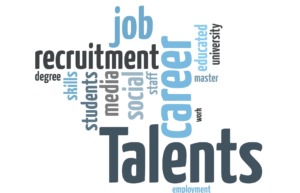
AI recruiting, which uses artificial intelligence to automate and improve various aspects of the hiring process, provides significant benefits such as time savings, cost reduction, improved quality, and increased diversity. Nonetheless, it introduces new challenges such as bias, communication gaps, trust concerns, and data privacy concerns.
Future AI recruiting trends are set to reshape the hiring landscape:
Intelligent Recruitment Automation:
AI’s skills in recruitment will grow to include more intricate and strategic responsibilities. This includes writing detailed job descriptions, creating candidate profiles, developing tailored assessments, and providing insightful feedback. AI’s ability to learn will allow it to improve and modify its performance over time.
Personalized Candidate Experience:
AI will transform candidate engagement by providing a more personalized and engaging journey. Individual candidates’ profiles, preferences, and behaviors will be used to tailor content, feedback, and guidance. AI will engage in more sophisticated interactions with candidates by utilizing natural language processing (NLP) and emotional intelligence.
Diversity and Inclusion Focus:
AI will be critical in promoting diversity and inclusion within organizations. AI will attract and retain candidates from diverse backgrounds, cultures, and perspectives by reducing bias and discrimination in hiring decisions. To support these efforts, AI will also measure and report on diversity metrics.
Data-Driven Decision Making:
AI’s analytical abilities will provide recruiters and hiring managers with data-backed insights and recommendations for making better hiring decisions. The technology will sift through a large amount of data from various sources, such as resumes, job applications, online platforms, assessments, interviews, and feedback. These insights will aid in forecasting candidates’ alignment with company culture, performance, retention rates, potential, and development opportunities.
Ethical and Responsible AI:
As AI plays a larger role in recruitment, ethical and legal standards will become increasingly important to ensure its security, transparency, fairness, and accountability. Recruiters and hiring managers must meticulously curate data and algorithms to ensure they accurately represent the diversity of the talent pool in order to maintain unbiased, fair results. To assess AI’s impact on candidates and the organization, regular audits and reviews will be required.
Wrap-up
AI recruiting tools are more than just technological advancements; they are game changers in the hiring industry. These tools allow recruiters to focus on strategic aspects from sourcing to onboarding, resulting in faster, more accurate, and bias-free hiring decisions.
AI recruiting tools will increasingly integrate SEO tools, web hosting services, and AI marketing tools in the future. SEO tools will increase the visibility of job postings, while user-friendly web hosting services will streamline the hiring process. Data-driven, personalized recruitment campaigns will be possible with AI marketing tools, making it easier to attract top talent. These advancements have the potential to transform recruitment, making it more efficient and effective.
Integration of issue-tracking software is a prominent future trend in the realm of AI recruiting tools. This integration promises to streamline the entire hiring process, from candidate sourcing to interview scheduling, while also improving communication and workflow optimization for more effective and competitive recruitment.
HR professionals are encouraged to embrace AI recruiting tools as valuable allies as they continue to evolve. Organizations can foster a more efficient, inclusive, and effective hiring process that aligns with the demands of the modern job market by leveraging AI.
FAQ’s
Q. Which AI recruiting tool is best for optimizing candidate sourcing?
Findem, Fetcher, ExactBuyer, and TurboHire are some of the AI recruiting tools designed to assist with candidate sourcing.
These tools use a variety of methods to find and attract qualified candidates for your open positions, including attribute searching, outreach automation, contact data enrichment, and talent intelligence.
Q. What are the top-rated AI tools for streamlining resume screening?
One of the most time-consuming and tedious tasks in the hiring process is resume screening, but AI can help automate and improve it.
Arya, HireEZ, Cogbee, and Ideal are some of the best AI recruiting tools for resume screening. These tools parse resumes, evaluate candidates’ skills and fit, and rank them based on your criteria using natural language processing, machine learning, and data analysis. You can learn more about these tools by visiting their websites.
Q. Which AI platform offers advanced interview scheduling and analysis?
AI can help with interview scheduling and analysis, two critical aspects of the hiring process.
HireVue is one of the AI platforms that provides advanced features for both.
It is a video interviewing platform that employs AI to automate scheduling, conduct assessments, and provide insights into candidates’ behavior and potential.
The AI recruiting platform claims to reduce hiring time by up to 90% while improving hiring quality by up to 88%. You can learn more about HireVue by going to its website.
Q. What’s the best AI tool for enhancing employee onboarding?
Employee onboarding is an important process that has an impact on employee retention, engagement, and performance. Employee onboarding can be improved with AI by providing personalized and interactive experiences, as well as data-driven feedback and support.
Leena AI is one of the best AI tools for employee onboarding. Leena AI is an AI-powered employee engagement platform that assists you in automating and optimizing your onboarding process.
It can assist you in creating personalized preboarding trips, assigning onboarding pals, sending automated reminders and notifications, collecting feedback and surveys, and much more.
Q. Which AI recruiting tool specializes in skill-based candidate-job matching?
Finding the right candidates for the right jobs relies heavily on skill-based matching. By analyzing candidates’ skills and qualifications, as well as job requirements and expectations, AI can assist with skill-based matching. Turing is an AI recruiting tool that specializes in skill-based matching.
It is an AI recruiting platform that matches you with the best remote software developers for your projects. Turing evaluates developers’ skills and experience, as well as your project’s needs and preferences, using machine learning algorithms.
The AI recruiting platform claims to reduce hiring time by up to 80% and increase developer productivity by up to 40%. You can learn more about Turing by visiting its website.
Q. Are there success stories of companies using AI tools for hiring?
Various companies have achieved success using AI tools for recruitment. Some examples are:-
L’Oréal’s AI Chatbot – Mya:
- Utilizes AI chatbot named Mya for candidate screening and engagement.
- Resulted in a 92% increase in candidate satisfaction.
- Reduced time-to-hire by 33%.
Hilton’s AI Tool – HireVue:
- Implements AI tool called HireVue for video interviews and assessments.
- Reduced time-to-hire from 43 days to 5 days.
- Improved quality of hire by 25%.
Positive Outcomes:
- These examples demonstrate AI’s ability to improve recruitment processes.
- Significant improvements in candidate satisfaction, time-to-hire, and hiring quality.
Q. How can I ensure ethical AI usage in the recruitment process?
Respecting candidates’ privacy, rights, and dignity, as well as promoting fairness, transparency, and diversity, constitutes ethical AI use in the recruitment process. You should follow some best practices to ensure ethical AI use in the recruitment process, such as:
- Candidate Awareness and Consent:
- Inform candidates about AI usage and obtain their consent.
- Vendor and Tool Selection:
- Choose reliable and reputable AI vendors and tools.
- System Testing and Auditing:
- Test and audit AI systems for accuracy and bias.
- Human Oversight and Intervention:
- Provide human oversight and intervention when necessary.
- Feedback and Improvement:
- Seek feedback from candidates and stakeholders for continuous improvement.
Q. What steps are involved in successfully implementing AI recruiting tools?
Steps for Implementation:
- Identifying Automated Tasks:
- Recognize tasks in talent acquisition that AI can automate or enhance.
- Research and Selection:
- Research and choose suitable AI recruiting tools aligned with needs and budget.
- Stakeholder Involvement:
- Engage key stakeholders, ensuring they comprehend AI’s benefits and limitations.
- Compliance and Ethical Considerations:
- Ensure adherence to legal and ethical standards, addressing bias and data privacy.
- Integration with HR Systems:
- Integrate AI tools with existing HR software and systems.
- Training and Education:
- Train recruiters and candidates on the proper use of AI tools.
- Performance Monitoring:
- Continuously monitor and measure AI tools’ performance and impact.
- Feedback and Adjustments:
- Seek feedback and make necessary adjustments for optimization.
Q. What future trends should I consider when choosing an AI recruiting tool?
AI recruiting is a rapidly evolving field that is constantly bringing in new trends and innovations. Some of the future trends to consider when selecting an AI recruiting tool are:
Conversational AI for Engaging Interactions:
- Utilizes conversational AI for more engaging interactions with candidates.
- The goal is to create more human-like interactions.
Predictive Analytics for Hiring Insights:
- Involves the use of predictive analytics to forecast hiring needs, outcomes, and risks.
- Based on data-driven insights, it assists organizations in making informed decisions.
Gamification and VR/AR for Realistic Assessments:
- Incorporates gamification and VR/AR technologies for immersive and realistic assessments.
- Candidates are given interactive and scenario-based simulations.
Blockchain and Biometrics for Identity Verification:
- Uses blockchain and biometrics to validate candidates’ identities and credentials.
- Improves hiring security and trust by ensuring accurate verification.
Emotional AI for Analyzing Candidates’ Emotions:
- Integrates emotional AI to analyze candidates’ emotions and personality traits.
- Provides information about candidates’ emotional responses and suitability for specific roles.
Q. Where can I find unbiased reviews and comparisons of AI recruiting tools?
Visit online platforms that specialize in HR software reviews to find unbiased reviews and comparisons of AI recruiting tools.
Some of these platforms are: –
SelectSoftware Reviews: This platform conducts extensive research and analysis on a variety of HR software categories, including AI recruiting. On this platform, you can find detailed reviews, comparisons, buyer guides, and best practices.
Software Advice: This website assists you in locating the best software for your company by providing expert advice, user reviews, ratings, and comparisons. On this platform, you can search through hundreds of HR software products, including AI recruiting tools.
G2: The software review platform is a peer-to-peer review site where verified users of various software products can provide feedback. On this platform, you can read unbiased reviews, ratings, and insights from real users of AI recruiting tools.
Q. What factors should I weigh when selecting the best AI recruiting software for a large organization?
Some factors to consider are:
- The software’s features and capabilities, including candidate sourcing, screening, matching, communication, assessment, and analytics.
- The integration and compatibility of the software with existing HR systems, such as ATS, CRM, and ERP.
- The security and compliance of the software with data protection regulations, such as GDPR, CCPA, and PDPA.
- The scalability and flexibility of the software to handle large volumes of candidates and changing hiring needs.
- The cost and ROI of the software, including the initial investment, maintenance fees, and potential savings and benefits.
Q. Are there any free trials available for the top AI recruiting tools?
Yes, some of the top AI recruiting tools offer free trials or demos for potential customers to test their features and performance. For example:
- Manatal: A 14-day free trial with full access to all features and unlimited users .
- HireVue: A free demo upon request with a personalized consultation .
- Ideal: A free demo upon request with a customized solution .
- XOR: A free demo upon request with a live chatbot .
Q. What is the average pricing range for the best AI recruiting tools in the market?
The pricing of AI recruiting tools varies depending on the features, functionalities, and customer needs. However, based on some available data, the average pricing range for the best AI recruiting tools in the market is between $0 to $300,000 per year .
Some factors that affect the pricing are:
- Total number of users, candidates, or employees
- Subscription plan type (monthly or annual)
- Customization and integration levels
- The availability of assistance and training
Q. Which AI recruiting tools integrate seamlessly with existing HR systems?
Many AI recruiting tools offer integration options with existing HR systems to streamline the hiring process and data flow.
Some examples are:
- Fetcher: Integrates with popular ATS platforms such as Greenhouse, Lever, Workable, SmartRecruiters, and more .
- Textio: Connect with LinkedIn, Workday, Greenhouse, Taleo, and more .
- Pymetrics: Compatible with SAP SuccessFactors, Oracle Taleo, iCIMS, Greenhouse, and more .
- Humanly: Integrates with Slack, Microsoft Teams, Zoom, Google Meet, Calendly, and more .
Q. What security measures do the best AI recruiting platforms offer for candidate data?
The best AI recruiting platforms offer various security measures for candidate data to ensure its privacy and protection.
Some of these measures are:
- Encryption of data in transit and at rest using industry-standard protocols such as SSL/TLS and AES
- Authentication and authorization of users using passwords, tokens, or biometrics
- Backup and recovery of data using cloud-based storage or servers
- Compliance with data protection regulations such as GDPR, CCPA, and PDPA
- Audit and monitoring of data access and usage using logs or reports
Q. Can AI recruiting tools help in reducing bias during the hiring process?
Yes, AI recruiting tools can help in reducing bias during the hiring process by providing objective and data-driven insights. Some ways that AI can help in reducing bias are:
- Scrubbing identifying information from resumes or applications such as name, gender, age, race, or ethnicity
- Focusing on specific skills or qualifications rather than subjective criteria such as appearance or personality
- Expanding the candidate pool by sourcing from diverse online platforms or networks
- Using standardized tests or assessments to measure candidate abilities or potential
- Providing feedback or suggestions to improve the language or tone of job descriptions or interview questions
Q. What training and support options are provided with the best AI recruiting solutions?
The best AI recruiting solutions provide various training and support options to help customers use their products effectively and efficiently.
Some of these options are:
- Online tutorials or guides that explain how to use the features or functions of the software
- Webinars or product tours that demonstrate how to use the software in real scenarios or cases
- Customer service or support teams that are available via phone, email, chat, or ticketing systems
- Dedicated account managers or consultants that provide personalized assistance or advice
- Community forums or blogs that share best practices or tips from other users or experts
Q. Are there any success stories of companies improving their recruitment with AI tools?
Yes, there are many success stories of companies improving their recruitment with AI tools. Some examples are:
- Hilton: Used HireVue’s AI-powered video interviews to reduce time-to-hire by 85%, improve candidate experience by 94%, and increase quality-of-hire by 6% .
- Unilever: Utilizes Pymetrics’ AI-based assessments to screen over 250,000 candidates, increase diversity by 16%, and reduce cost-per-hire by 80% .
- L’Oréal: Employs XOR’s AI chatbot to automate candidate communication, increase response rate by 400%, and reduce time-to-hire by 40% .
- Atlassian: Used Textio’s AI-enhanced writing platform to improve job descriptions, attract 12% more female applicants, and increase hires from underrepresented groups by 80% .
Q. Do AI recruiting tools offer scalability for businesses with changing hiring needs?
Yes, AI recruiting tools provide scalability for businesses with fluctuating hiring requirements. AI recruiting tools can efficiently handle large volumes of candidates and data, allowing businesses to scale their recruitment efforts as needed.
These tools can also be customized to meet specific hiring needs or situations, such as high-volume hiring, remote hiring, or niche hiring.
Q. What are the potential ROI and time-saving benefits of using AI in recruiting?
Using AI in recruiting can provide various ROI and time-saving benefits for businesses.
Some of these benefits are:
- Improved quality-of-hire: AI can help businesses find and hire the best candidates for their roles, leading to higher performance, retention, and satisfaction.
- Reduced cost-per-hire: These tools assist businesses automate or streamline various recruitment tasks, such as sourcing, screening, or scheduling, reducing the need for manual labor and minimizing hiring costs.
- Enhanced candidate experience: AI based recruitment allows businesses communicate with candidates effectively and efficiently, providing them with a clear, smooth, and engaging hiring process.
- Increased diversity and inclusion: AI can help businesses reduce or eliminate bias in their hiring decisions, creating a fair and consistent process for all candidates and promoting a diverse and inclusive workforce.
Looking for more help with your creative projects? Check out these additional useful articles:
- 13 BEST Issue-Tracking Software of 2023 (Top Picks Ranked)
- 11 BEST AI Marketing Tools to Automate Your Business (2023)!
- 7+ Best Credit Repair Software Options: Turbocharge Your Finances in 2023!
- 13+ BEST Transcription Software & Service to Convert Audio/Video to Text (2023)
- 7+ BEST Text-to-Speech Apps for Android in 2023: Even Siri Would Envy!
- Hyperlocal Social Media Marketing; The Secret Sauce To Crushing Your Competitors!
- 13 BEST YouTube Video Downloader Online in 2023 (Free & Paid Options).
- 13 Best YouTube To MP3 Converters of 2023: The Ultimate Soundtrack Snatchers!
- Best Online Courses Platforms: Create & Sell Courses Easily (2023).
- Best AI Photo Editing Software in July 2023: Transform Your Images With Ease.
- Best AI Image Generator Tools (Ranked for July 2023).
- Best Ecommerce Platforms of 2023: Dominate The Online Market Like A Pro!
- Best AI Website Builders For Creating Professional Websites Quickly In 2023.
- Best Web Hosting Services of 2023.
- Best Landing Page Builders for 2023.
- Best SEO Tools to Rank Your Website in 2023.
- 9+ Best AI Video Editing Software Of 2023 (Ranked & Reviewed)
- 7+ Best Video Editing Software for 2023 (Windows & Mac).
- 7+ Best AI Copywriting Tools for Beginners in 2023 (Ranked & Reviewed).

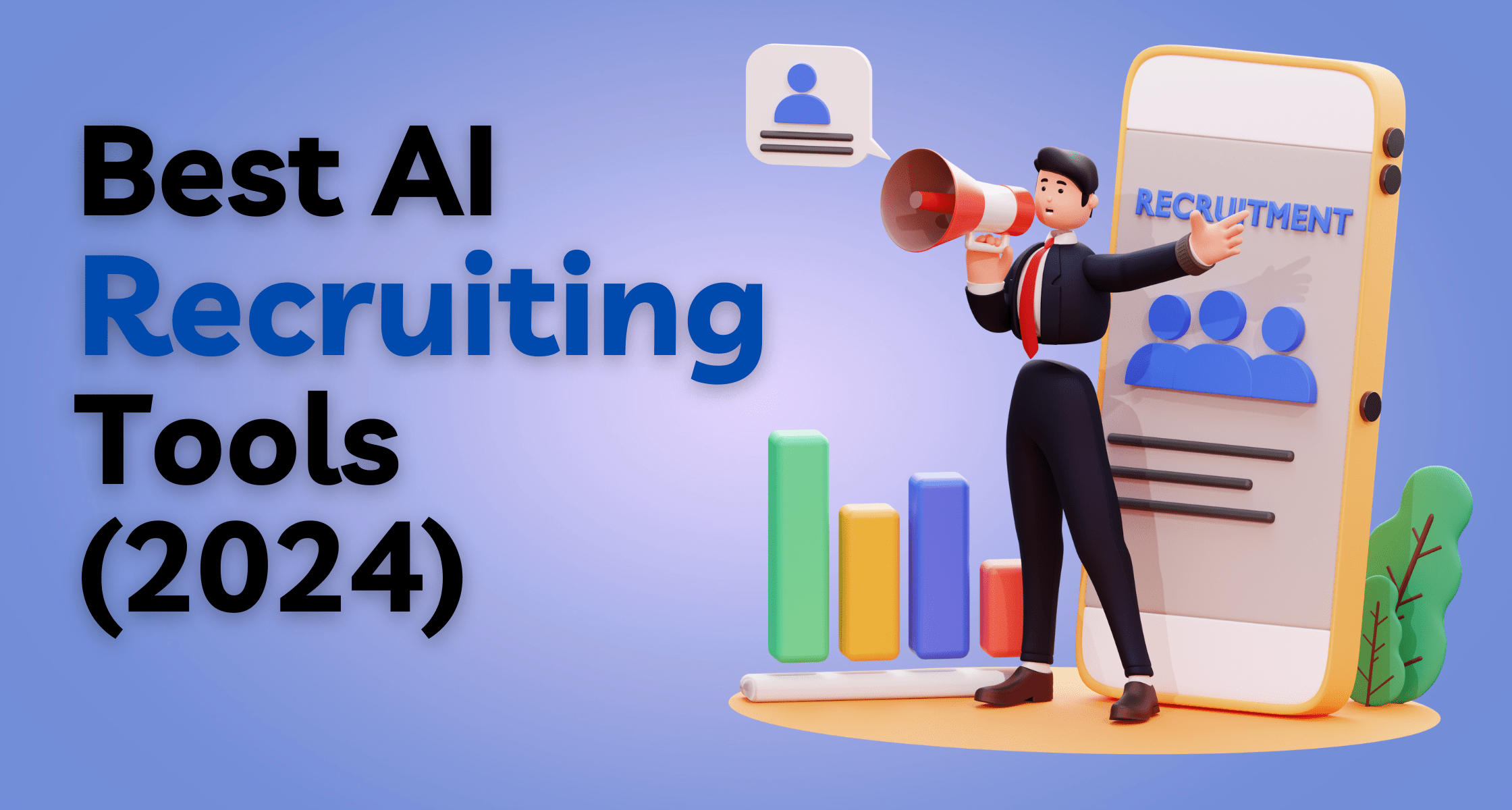
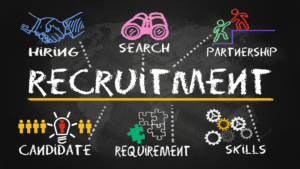
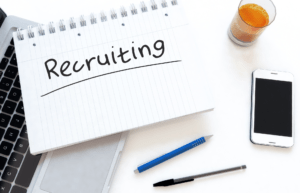



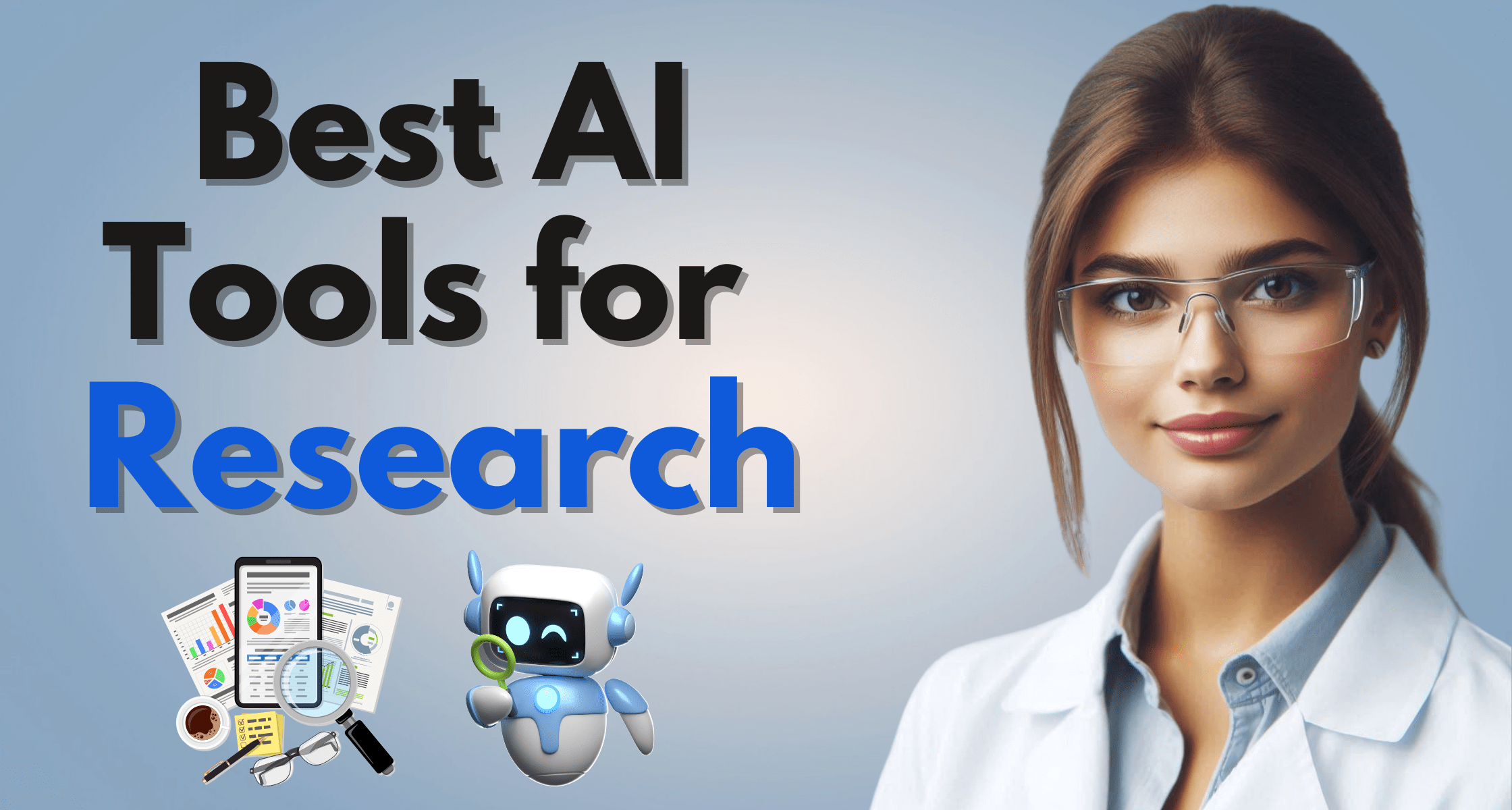
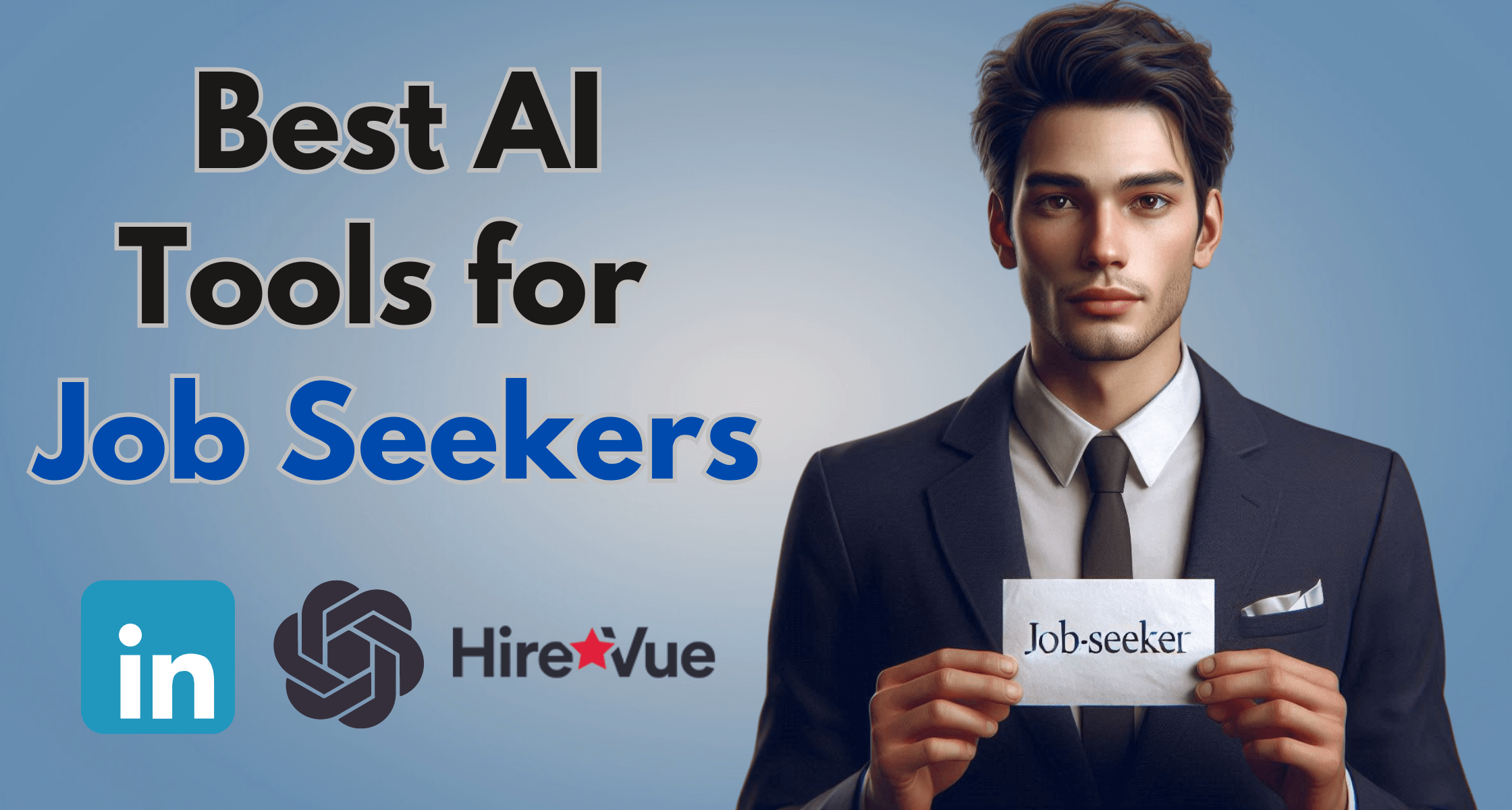

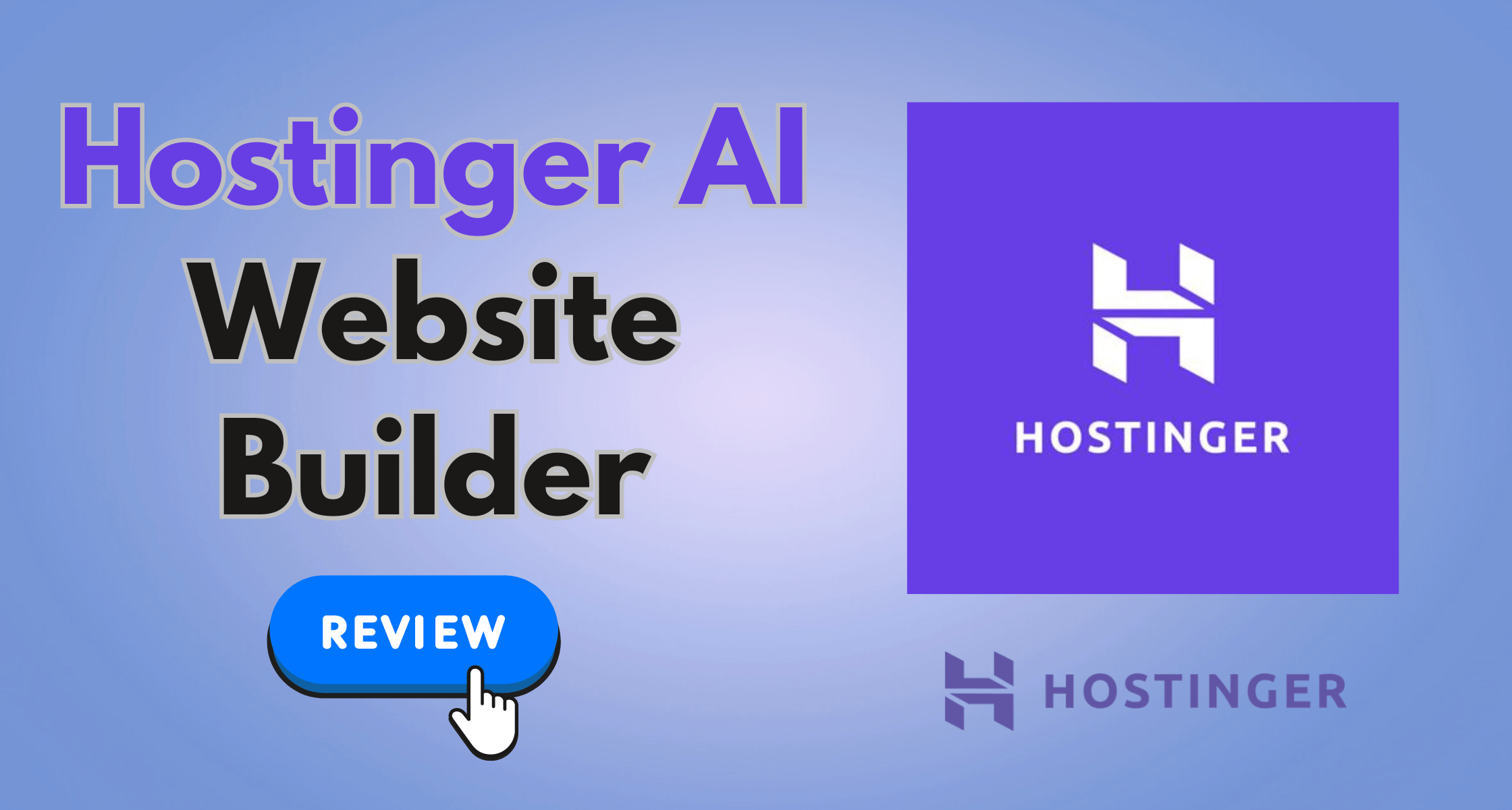
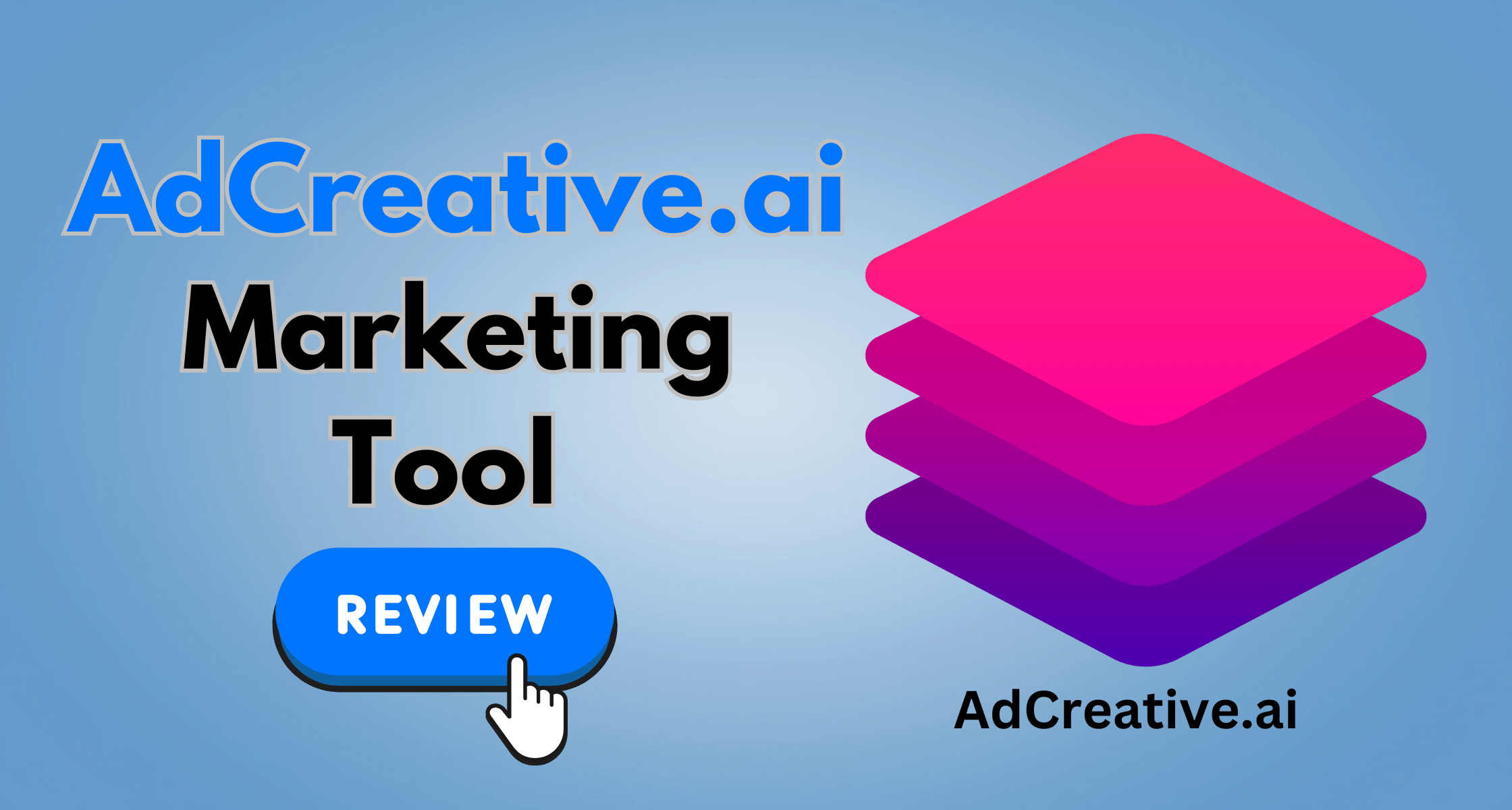
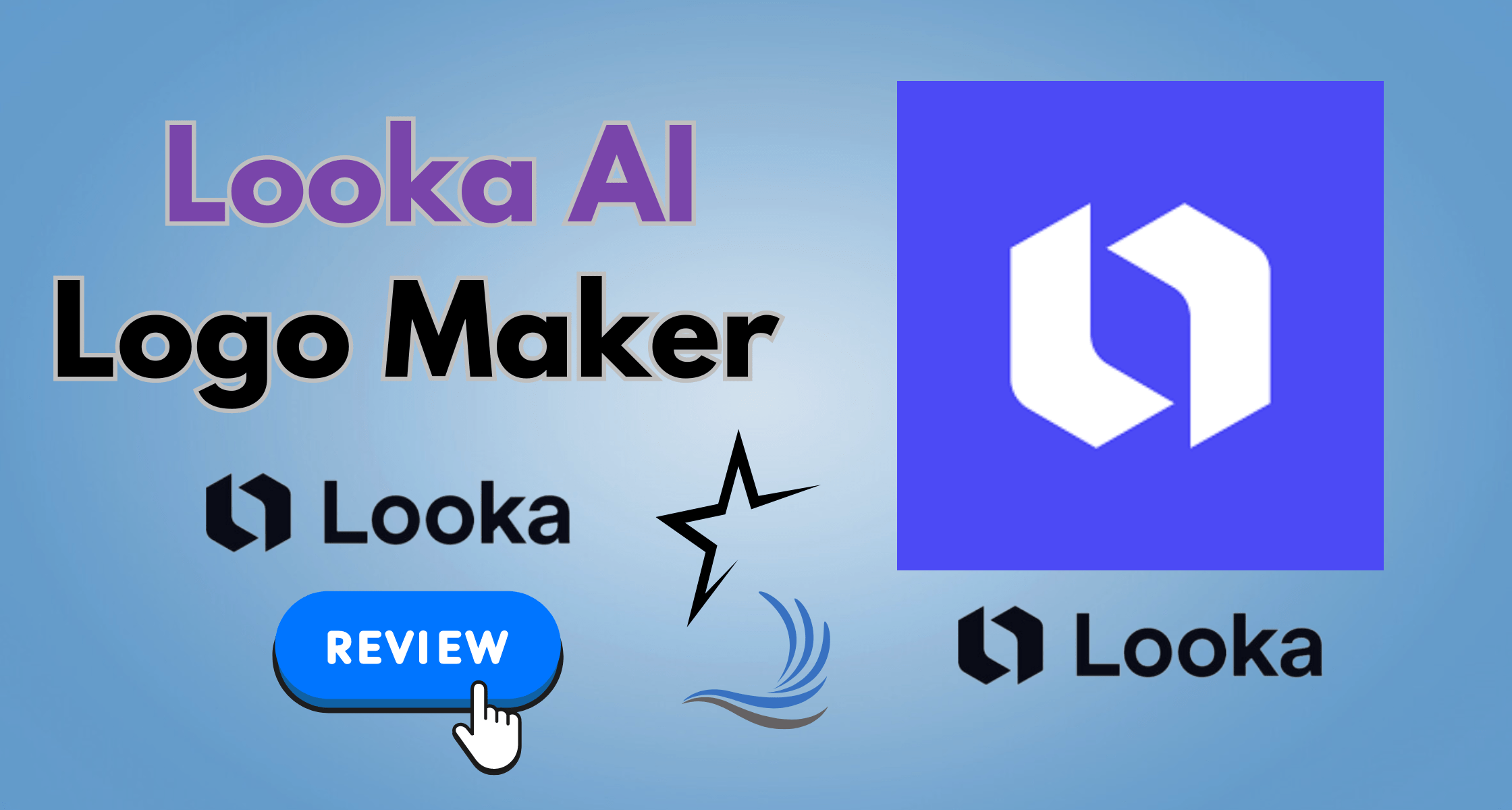
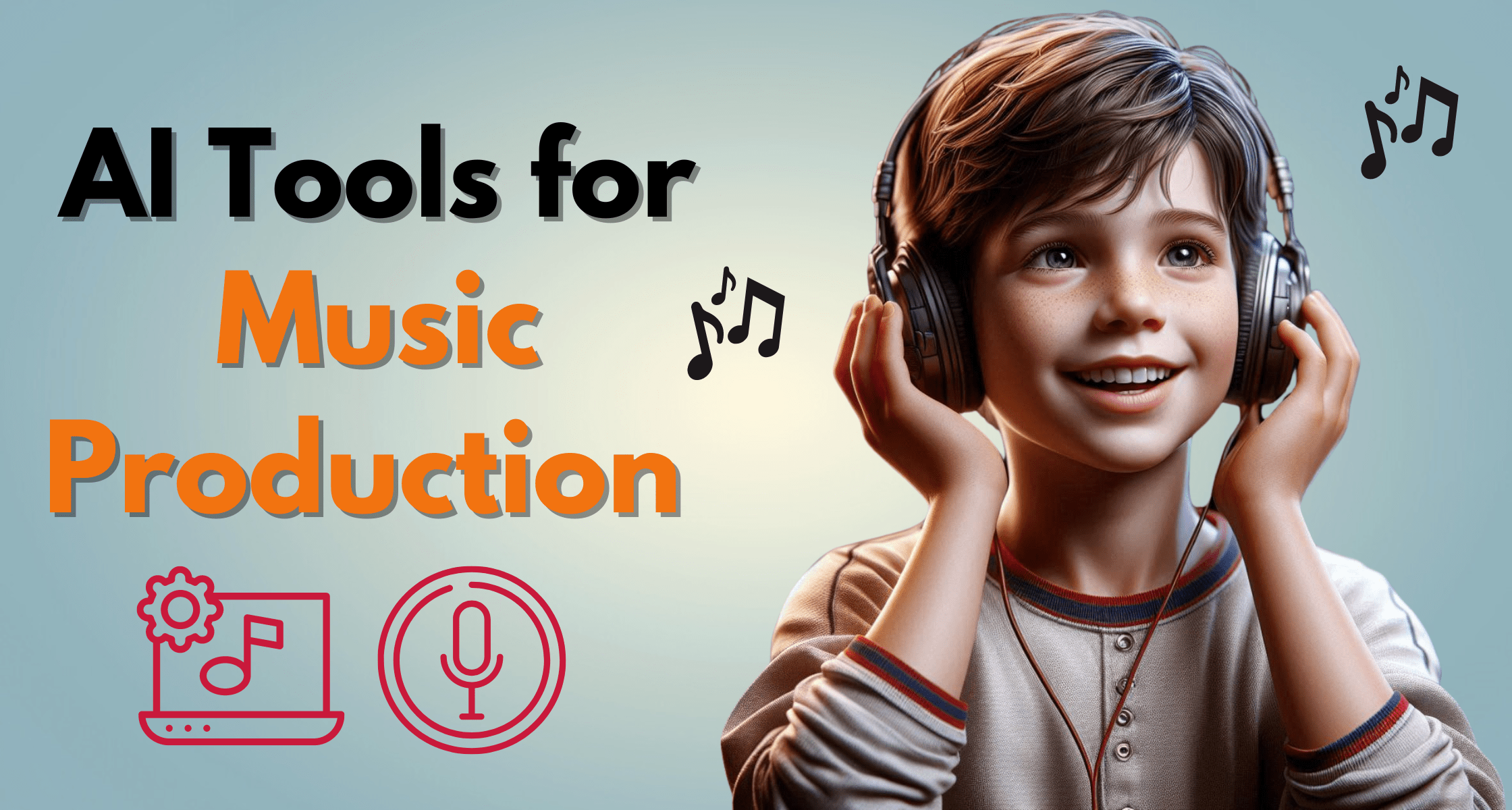
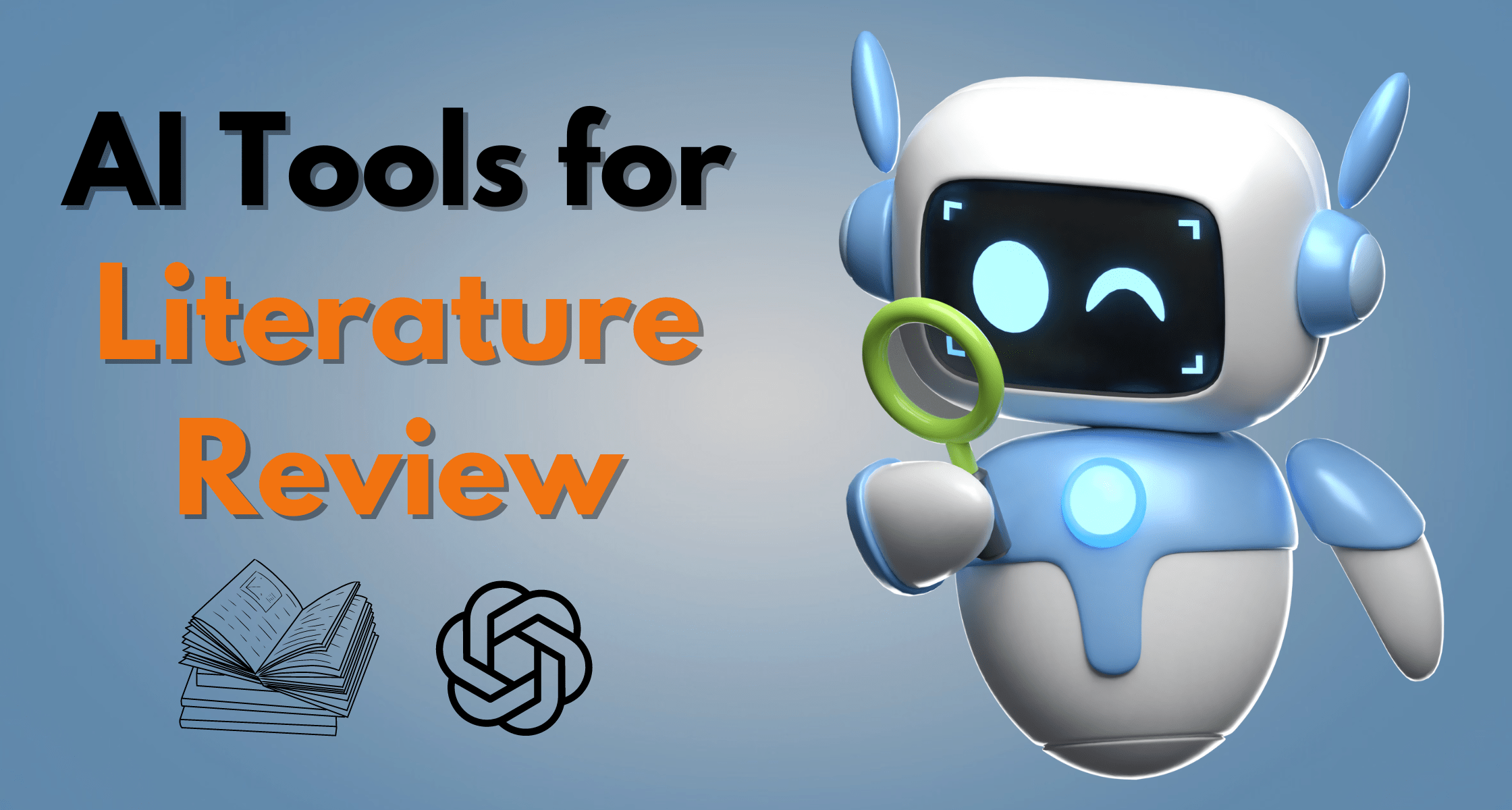

[…] Top 13 BEST AI Recruiting Tools for Future-proof Hiring Process (2023)! […]
[…] See also Top 13 Best AI Recruiting Tools For Future-Proof Hiring Process (2023) […]
[…] See also Top 13 Best AI Recruiting Tools For Future-Proof Hiring Process (2023) […]
[…] Top 13 BEST AI Recruiting Tools for Future-proof Hiring Process (2023)! […]
[…] AI copywriting tools and paraphrasing tools, AI social media schedulers, AI SEO content analyzers, AI recruiting tools, and AI Ad managers are all part of […]
[…] Top 13 BEST AI Recruiting Tools for Future-proof Hiring Process (2023)! […]
[…] Top 13 BEST AI Recruiting Tools for Future-proof Hiring Process (2023) […]
[…] project management, with time-tracking features (almost as good as these AI marketing tools, & AI recruiting tools) and real-time updates when issues are […]
[…] rise of AI SEO tools coincides with the rise of AI recruiting tools, AI marketing tools, as well as issue-tracking software. These AI-powered solutions redefine […]
[…] platforms are now thriving as vibrant online business hubs, expertly blending AI marketing tools, recruiting tools, and website builders. This collaboration creates engaging experiences that foster growth for both […]
[…] See also Top 13 Best AI Recruiting Tools For Future-Proof Hiring Process (2023) […]
[…] See also Top 13 Best AI Recruiting Tools For Future-Proof Hiring Process (2023) […]
[…] seen the best AI software for video editing, marketing, recruiting, students, and credit repair in recent articles. Now, let’s have a look at some of the most […]
[…] seen the best AI software for video editing, generating images, students, recruiting, business, and credit repair in recent articles. Let’s take a look at some of the best […]
[…] seen the best AI software for video editing, marketing, recruiting, students, and credit repair in recent articles. Let’s take a look at some of the best AI […]
[…] seen the best AI software for photo editing, marketing, recruiting, issue-tracking, sales, and credit repair in recent articles. Let’s take a look at some of the […]
[…] seen the best AI software for video editing, marketing, recruiting, students, business, sales, and credit repair in recent articles. Let’s take a look at some of […]
[…] seen the best AI tools for video editing, writing emails, recruiting, credit-repair, sales, and affiliate marketing in recent articles. Let’s take a look at […]